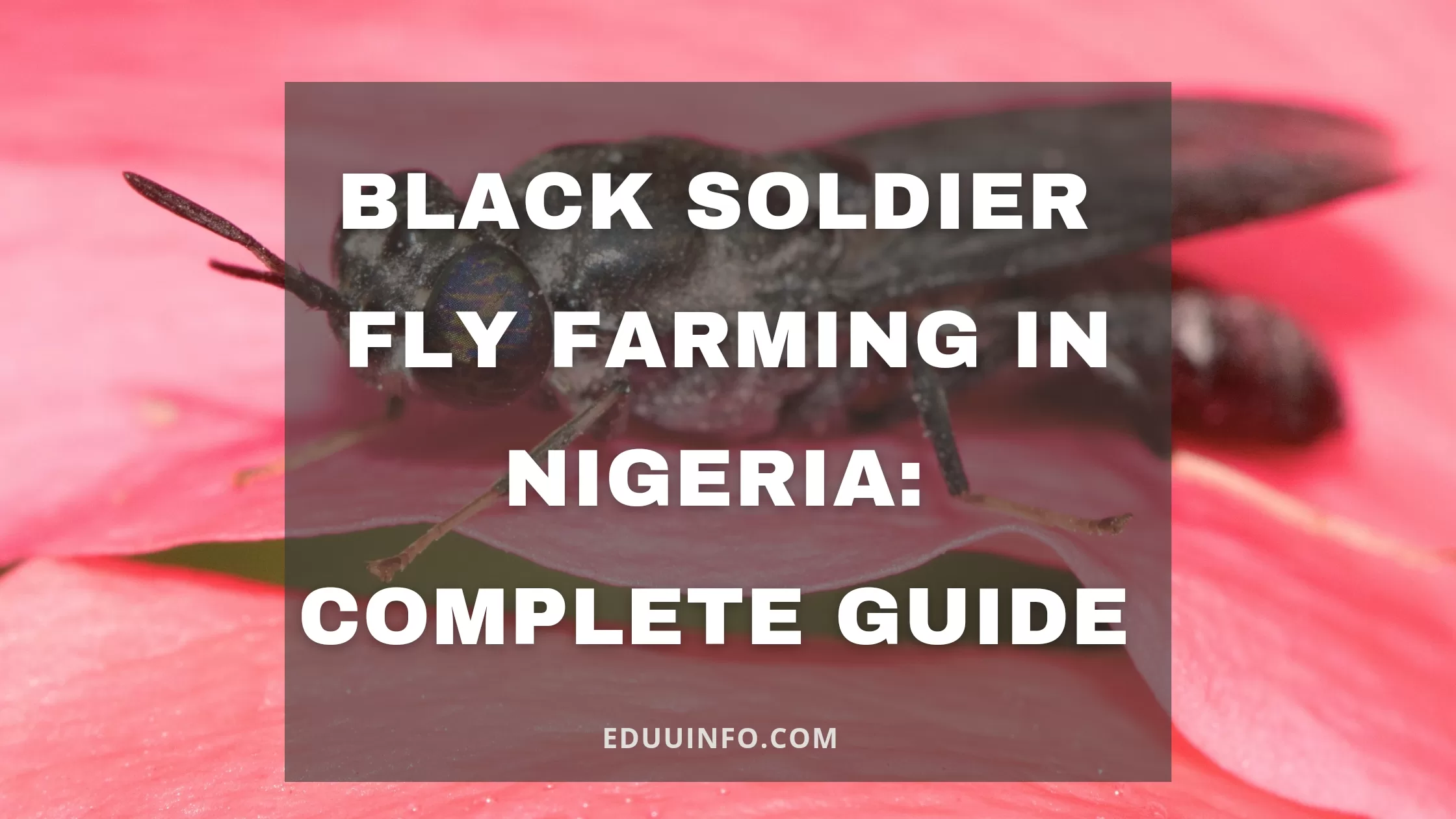How to Start Black Soldier Fly Farming in Nigeria 2024: Complete Guide
Are you interested in the Black soldier fly farming? Then here is a guide on how to start Black soldier fly farming in Nigeria
Black soldier fly farming is gaining attention in Nigeria as a sustainable and cost-effective method of producing protein-rich feed for fish and other livestock.
In this article, we will discuss everything you need to know about black soldier fly farming in Nigeria, including its profitability, startup costs, and how to get started.
Before that, let’s look into
Read also How Lucrative is Goat Farming in Nigeria
What you should know about Black Soldiers fly
Black soldier flies (Hermetia illucens) are native to Nigeria and can be found in various regions, especially in the rainforest and tropical zones.
These flies are known for their ability to consume organic waste materials, such as kitchen waste and manure, making them ideal for sustainable farming practices
More so, Black soldier fly larvae are rich in protein and can be used as a nutritious feed source for fish, poultry, and other livestock
Lastly, The larvae can be easily reared in controlled environments, such as small-scale farms or even backyard setups, that will make it accessible to farmers of all scales
How profitable is Black soldier fly farming in Nigeria?
Black soldier fly farming is highly profitable in Nigeria due to the increasing demand for protein-rich feed for livestock, particularly fish
This is because Farmers can significantly decrease their production costs and increase their profit margins when they reduce their reliance on expensive fishmeal,
Additionally, the market for black soldier fly larvae as a feed ingredient is expanding, which will provide opportunities for farmers to generate additional income
Cost of starting Black soldier fly farming in Nigeria
The startup costs for black soldier fly farming in Nigeria can vary depending on the scale of the operation and the infrastructure required.
However, you need to get the basic equipment such as breeding containers, and larval rearing trays, and a suitable substrate can be relatively affordable and easily sourced
In addition, larger-scale operations may require more substantial investments in infrastructure, such as dedicated rearing facilities and automated systems for larvae collection
See also How to Start Catfish Farming in Nigeria 2024: Expert Guide
How to start Black Soldier fly farming in Nigeria
Having taken you through what you need to start a Black soldier fly farming in Nigeria, get started:
- Choose a suitable location: Black soldier flies do well in warm and humid environments
So you need to select a location with the right climate
- Set up breeding containers: Create breeding containers using plastic drums or other suitable containers.
These containers should have small holes for flies to enter and lay their eggs
- Prepare a suitable substrate: Black soldier fly larvae need a substrate rich in organic waste materials.
This can include kitchen waste, manure, or other organic matter
- Attract black soldier flies to your breeding containers by placing suitable food sources, such as fruit peels or kitchen waste, inside
- Once the larvae hatch, transfer them to larval-rearing trays or containers with a suitable substrate.
Ensure proper ventilation and moisture levels for proper growth
- Feed and care for the larvae: Provide a continuous supply of organic waste materials for the larvae to feed on.
Do not forget to Monitor temperature and moisture levels to maintain good conditions
- When the larvae reach the desired size, harvest them for use as feed for fish or other livestock.
They can be dried, processed into meals, or used as fresh
Conclusion
Black soldier fly farming in Nigeria is a sustainable and cost-effective solution for producing protein-rich feed for livestock.
It helps in reducing production costs and provides a valuable source of nutrition for livestock
In addition, it contributes to the profitability and sustainability of farming operations in Nigeria.
We hope this article has provided you with useful information on the Black soldier fly farming in Nigeria
If you have any questions or comments, please feel free to leave them in the comment section below.
Thank you for reading
You may also like How to Start Snail Farming at Home
FAQs about Black Soldier Fly Farming in Nigeria
What is Black soldier fly farming and why is it gaining popularity in Nigeria?
Black soldier fly farming involves rearing black soldier flies for various purposes, such as producing high-quality protein feed for livestock, including catfish.
It is gaining popularity in Nigeria due to its potential to reduce feed costs, improve fish feeding management, create job opportunities, and promote a cleaner environment
How do black soldier flies contribute to reducing fish feed costs for catfish farmers in Nigeria?
Black soldier flies are known for their ability to consume organic waste materials, such as kitchen waste and manure.
Using black soldier fly larvae as a protein source in fish feed, catfish farmers can help reduce their reliance on expensive fishmeal, which is a major component of fish feed.
This will turn decrease feed costs and improve the profitability of catfish farming
Are black soldier flies native to Nigeria?
Yes, black soldier flies are native to Nigeria.
They have been found in various regions of the country, particularly in the South-West to South-South regions, which have rainforest/tropical zones.
What are the benefits of using black soldier fly larvae in fish feed production?
Using black soldier fly larvae in fish feed production provides a sustainable and cost-effective alternative to fishmeal, which is often sourced from wild-caught baitfish.
More so, black soldier fly larvae have a rapid development time of less than one month, allowing for efficient production.
Lastly, their ability to consume organic waste materials helps in waste management and reduces environmental pollution
Are there any challenges or risks associated with black soldier fly farming in Nigeria?
While black soldier fly farming has great potential, there are some challenges and risks to consider.
One challenge is the need for proper knowledge and training on the optimal conditions for rearing black soldier flies.
Additionally, there may be regulatory and market challenges in terms of ensuring the quality and safety of black soldier fly larvae and their products.
However, with proper guidance and support, these challenges can be overcome

